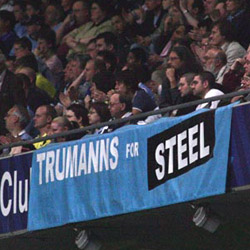Trumanns for Steel
 Questions invariably arise when supporters from all corners of the world, many (or most) of whom have never actually met, fork out for a banner reading simply, Trumanns For Steel.
Questions invariably arise when supporters from all corners of the world, many (or most) of whom have never actually met, fork out for a banner reading simply, Trumanns For Steel.
Explaining Trumanns is, in football parlance, 'a big ask'. Rather like trying to account for, say, inflatable bananas during the late 80s. How do you explain the unexplainable? How do you account for Trumanns' fathomless complexities? What does it mean? Does anyone even understand it?
Readers already familiar with the Trumanns legend speak of its mythical powers. Others refer to it as the 'Third Man' in the Mercer-Allison dynasty. Some have even come to believe that success will continue to elude City until Trumanns returns. A sort of second-coming, if you like.
It's a myth. A legend. Our 12th man.
And yet, surprisingly little is known about City's shadowy talisman. Here then, is a brief history.
First, to the nitty gritty.
One-dimensionally speaking, Trumanns was nothing more than a big sign. An advertising hoarding, basically. Its message was clear enough. In yellow and red it screamed, "For all your steel requirements, think Trumanns". Its meaning could scarcely be misunderstood. The possibility that the purchasing of steel and the watching of football did not go entirely hand in hand is not important in this story.
What is important is that, for many of us growing up watching City, Trumanns was a stable unswerving presence. A reassuring figure. Always there.
Like many of us, it moved around the ground. It was nomadic - almost as if it tired of watching the action from a certain part of the ground and put in a formal request to the club to be moved to another stand for the following season. Managers, players, kits - even Chairmen - came and went. But Trumanns was always there. A constant. You just never knew where it would pop up next. One season it'd be on the Main Stand. The next it'd be on the Kippax roof.
Metaphorically speaking, Trumanns represented City in so many ways. You were drawn to it. It was hypnotic. Magnetic, almost. You had no choice in the matter. Like City, it was always there. Also like City, it never bloody changed.
It represented a kind of escapism. During quiet moments of matches you'd find yourself 'drifting off' and settling on Trumanns instead of watching the game. One glance in its direction and before you knew it you'd missed a goal.
All very well. But why bring it back? Surely Trumanns lacks the immediate punch required for today's harsh sound-bite culture. Some will sniff that it doesn't chime with the 'modern game'. Quite possibly, indeed probably, many will simply be at a loss to explain it. And I can't even begin to imagine how visiting supporters will react when seeing it for the first time - to say nothing of the BBC cameras.
This is a good thing. I relish their lack of comprehension. It means they don't 'get it'. They lack finesse. Our gods are not their gods. We worship at a different alter.
Of course, to others, Trumanns is not meaningless. It drips with heavily ritualistic symbolism.
And, it's certainly not just to conjure up pleasing images of old-fashioned promotional display boards that it's presence is needed once more. Trumanns is symptomatic of our most success-littered period. Leaf through some old programmes. And there it is, hovering tantalizingly in the background. Keeping watch. It made its way into a disproportionate number of photos, to the extent that many came to think of it as a kind of Guardian Angel.
The reason for this is anyone's guess. But, for a club that has made an art form of avoiding the chequered-flag-of-success over the years, we're in no position to negotiate at length. To put it into perspective, we used to win things. And now we don't.
Also, and this cannot be overstated, Trumanns Mk 2 is not a City flag. It's a Bluemoon flag. As such it aspires to reflect the site as well as the club: contrary; different; subversive; provocative; stylish; absurd; and, typically City. Mystery, mystery, mystery.
About half way through 24 Hour Party People (a film about another great Mancunian institution - Factory Records), Steve Coogan, playing Tony Wilson, quoting John Ford says, "When you have to choose between the truth and the legend - print the legend."
Well, Bluemoon has printed the legend. And the legend is: 'Trumanns For Steel'.
Durutti City, 2005